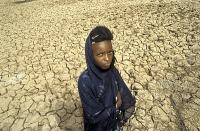Bjorn Lomborg often points out that AIDS and malaria are devastating parts of the developing world, and that we could easily and relatively cheaply invest in effective solutions that would save millions. This is entirely true. The question we should ask is: what does this have to do with climate change?
The world has long-known about such ruinous diseases and has done shockingly little to fight these largely preventable killers. Does this mean that we should also do nothing to try and curb the emerging catastrophe of climate change?
Lets put is this way, Lomborg’s well-worn argument cooked up through the Copenhagen Consensus is as nonsensical as suggesting that if you are diagnosed with cancer, you shouldn’t bother doing anything about it because it is more cost effective to brush your teeth.
Yet Lomborg continues to pit climate change against global poverty in an ivory tower cost-benefit exercise that ignores the devastating impact climate change is already having on the developing world.
The UN estimated last week that by 2020, unchecked global warming will devastate 250 million Africans through increased drought and water stress. Crop yields are expected to drop by as much as 50%.
Fourteen countries in Africa already endure devastating water shortages. This number is expected to increase to twenty-five by 2030. Recent research shows that global warming will reduce overall rainfall in southern Africa 25%.
Small-scale farming produces most of the food in Africa. It also provides employment for 70% of the working people. Global climate change will dangerously undermine the ability of Africans to feed and support themselves by making these droughts far more likely.
“In our models, the Indian Ocean shows very clear and dramatic warming into the future, which means more and more drought for southern Africa,” said Dr. James W. Hurrell, author of a recent study by the US-based National Center for Atmospheric Research.
Dr. Richard Washington, of Oxford University is somewhat more blunt: “When the rains fail, people die.” The last major drought in southern Africa in 2002 left over 14 million people in need of direct food aid.
African coastal areas are also at risk from extreme weather and rising sea levels. We can expect more frequent disasters like Mozambique’s devastating floods of February 2000, which affected the livelihoods of 1.5 million people and cost $550 million in reconstruction and emergency relief.
Such grim scenarios are already unfolding in the developing world. It is sadly ironic that the people affected most climate change will have contributed the least to the problem. It is worse still when a first-world academic like Lomborg makes a career out of trying to convince the public that we should ignore this unfolding catastrophe – projected to hit the world’s poorest the hardest.
Subscribe to our newsletter
Stay up to date with DeSmog news and alerts







